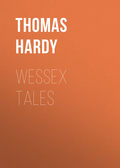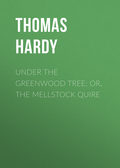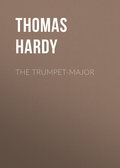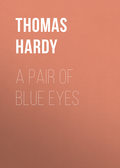полная версия

Томас Харди (Гарди)
Late Lyrics and Earlier, With Many Other Verses
THE PASSER-BY
(L. H. RECALLS HER ROMANCE)
He used to pass, well-trimmed and brushed,
My window every day,
And when I smiled on him he blushed,
That youth, quite as a girl might; aye,
In the shyest way.
Thus often did he pass hereby,
That youth of bounding gait,
Until the one who blushed was I,
And he became, as here I sate,
My joy, my fate.
And now he passes by no more,
That youth I loved too true!
I grieve should he, as here of yore,
Pass elsewhere, seated in his view,
Some maiden new!
If such should be, alas for her!
He’ll make her feel him dear,
Become her daily comforter,
Then tire him of her beauteous gear,
And disappear!
“I WAS THE MIDMOST”
I was the midmost of my world
When first I frisked me free,
For though within its circuit gleamed
But a small company,
And I was immature, they seemed
To bend their looks on me.
She was the midmost of my world
When I went further forth,
And hence it was that, whether I turned
To south, east, west, or north,
Beams of an all-day Polestar burned
From that new axe of earth.
Where now is midmost in my world?
I trace it not at all:
No midmost shows it here, or there,
When wistful voices call
“We are fain! We are fain!” from everywhere
On Earth’s bewildering ball!
A SOUND IN THE NIGHT
(WOODSFORD CASTLE: 17–)
“What do I catch upon the night-wind, husband? —
What is it sounds in this house so eerily?
It seems to be a woman’s voice: each little while I hear it,
And it much troubles me!”
“’Tis but the eaves dripping down upon the plinth-slopes:
Letting fancies worry thee! – sure ’tis a foolish thing,
When we were on’y coupled half-an-hour before the noontide,
And now it’s but evening.”
“Yet seems it still a woman’s voice outside the castle, husband,
And ’tis cold to-night, and rain beats, and this is a lonely place.
Didst thou fathom much of womankind in travel or adventure
Ere ever thou sawest my face?”
“It may be a tree, bride, that rubs his arms acrosswise,
If it is not the eaves-drip upon the lower slopes,
Or the river at the bend, where it whirls about the hatches
Like a creature that sighs and mopes.”
“Yet it still seems to me like the crying of a woman,
And it saddens me much that so piteous a sound
On this my bridal night when I would get agone from sorrow
Should so ghost-like wander round!”
“To satisfy thee, Love, I will strike the flint-and-steel, then,
And set the rush-candle up, and undo the door,
And take the new horn-lantern that we bought upon our journey,
And throw the light over the moor.”
He struck a light, and breeched and booted in the further chamber,
And lit the new horn-lantern and went from her sight,
And vanished down the turret; and she heard him pass the postern,
And go out into the night.
She listened as she lay, till she heard his step returning,
And his voice as he unclothed him: “’Twas nothing, as I said,
But the nor’-west wind a-blowing from the moor ath’art the river,
And the tree that taps the gurgoyle-head.”
“Nay, husband, you perplex me; for if the noise I heard here,
Awaking me from sleep so, were but as you avow,
The rain-fall, and the wind, and the tree-bough, and the river,
Why is it silent now?
“And why is thy hand and thy clasping arm so shaking,
And thy sleeve and tags of hair so muddy and so wet,
And why feel I thy heart a-thumping every time thou kissest me,
And thy breath as if hard to get?”
He lay there in silence for a while, still quickly breathing,
Then started up and walked about the room resentfully:
“O woman, witch, whom I, in sooth, against my will have wedded,
Why castedst thou thy spells on me?
“There was one I loved once: the cry you heard was her cry:
She came to me to-night, and her plight was passing sore,
As no woman.. Yea, and it was e’en the cry you heard, wife,
But she will cry no more!
“And now I can’t abide thee: this place, it hath a curse on’t,
This farmstead once a castle: I’ll get me straight away!”
He dressed this time in darkness, unspeaking, as she listened,
And went ere the dawn turned day.
They found a woman’s body at a spot called Rocky Shallow,
Where the Froom stream curves amid the moorland, washed aground,
And they searched about for him, the yeoman, who had darkly known her,
But he could not be found.
And the bride left for good-and-all the farmstead once a castle,
And in a county far away lives, mourns, and sleeps alone,
And thinks in windy weather that she hears a woman crying,
And sometimes an infant’s moan.
ON A DISCOVERED CURL OF HAIR
When your soft welcomings were said,
This curl was waving on your head,
And when we walked where breakers dinned
It sported in the sun and wind,
And when I had won your words of grace
It brushed and clung about my face.
Then, to abate the misery
Of absentness, you gave it me.
Where are its fellows now? Ah, they
For brightest brown have donned a gray,
And gone into a caverned ark,
Ever unopened, always dark!
Yet this one curl, untouched of time,
Beams with live brown as in its prime,
So that it seems I even could now
Restore it to the living brow
By bearing down the western road
Till I had reached your old abode.
February 1913.
AN OLD LIKENESS
(RECALLING R. T.)
Who would have thought
That, not having missed her
Talks, tears, laughter
In absence, or sought
To recall for so long
Her gamut of song;
Or ever to waft her
Signal of aught
That she, fancy-fanned,
Would well understand,
I should have kissed her
Picture when scanned
Yawning years after!
Yet, seeing her poor
Dim-outlined form
Chancewise at night-time,
Some old allure
Came on me, warm,
Fresh, pleadful, pure,
As in that bright time
At a far season
Of love and unreason,
And took me by storm
Here in this blight-time!
And thus it arose
That, yawning years after
Our early flows
Of wit and laughter,
And framing of rhymes
At idle times,
At sight of her painting,
Though she lies cold
In churchyard mould,
I took its feinting
As real, and kissed it,
As if I had wist it
Herself of old.
HER APOTHEOSIS
“Secretum meum mihi”
(FADED WOMAN’S SONG)
There was a spell of leisure,
No record vouches when;
With honours, praises, pleasure
To womankind from men.
But no such lures bewitched me,
No hand was stretched to raise,
No gracious gifts enriched me,
No voices sang my praise.
Yet an iris at that season
Amid the accustomed slight
From denseness, dull unreason,
Ringed me with living light.
“SACRED TO THE MEMORY”
(MARY H.)
That “Sacred to the Memory”
Is clearly carven there I own,
And all may think that on the stone
The words have been inscribed by me
In bare conventionality.
They know not and will never know
That my full script is not confined
To that stone space, but stands deep lined
Upon the landscape high and low
Wherein she made such worthy show.
TO A WELL-NAMED DWELLING
Glad old house of lichened stonework,
What I owed you in my lone work,
Noon and night!
Whensoever faint or ailing,
Letting go my grasp and failing,
You lent light.
How by that fair title came you?
Did some forward eye so name you
Knowing that one,
Sauntering down his century blindly,
Would remark your sound, so kindly,
And be won?
Smile in sunlight, sleep in moonlight,
Bask in April, May, and June-light,
Zephyr-fanned;
Let your chambers show no sorrow,
Blanching day, or stuporing morrow,
While they stand.
THE WHIPPER-IN
My father was the whipper-in, —
Is still – if I’m not misled?
And now I see, where the hedge is thin,
A little spot of red;
Surely it is my father
Going to the kennel-shed!
“I cursed and fought my father – aye,
And sailed to a foreign land;
And feeling sorry, I’m back, to stay,
Please God, as his helping hand.
Surely it is my father
Near where the kennels stand?”
“ – True. Whipper-in he used to be
For twenty years or more;
And you did go away to sea
As youths have done before.
Yes, oddly enough that red there
Is the very coat he wore.
“But he – he’s dead; was thrown somehow,
And gave his back a crick,
And though that is his coat, ’tis now
The scarecrow of a rick;
You’ll see when you get nearer —
’Tis spread out on a stick.
“You see, when all had settled down
Your mother’s things were sold,
And she went back to her own town,
And the coat, ate out with mould,
Is now used by the farmer
For scaring, as ’tis old.”
A MILITARY APPOINTMENT
(SCHERZANDO)
“So back you have come from the town, Nan, dear!
And have you seen him there, or near —
That soldier of mine —
Who long since promised to meet me here?”
“ – O yes, Nell: from the town I come,
And have seen your lover on sick-leave home —
That soldier of yours —
Who swore to meet you, or Strike-him-dumb;
“But has kept himself of late away;
Yet, – in short, he’s coming, I heard him say —
That lover of yours —
To this very spot on this very day.”
“ – Then I’ll wait, I’ll wait, through wet or dry!
I’ll give him a goblet brimming high —
This lover of mine —
And not of complaint one word or sigh!”
“ – Nell, him I have chanced so much to see,
That – he has grown the lover of me! —
That lover of yours —
And it’s here our meeting is planned to be.”
THE MILESTONE BY THE RABBIT-BURROW
(ON YELL’HAM HILL)
In my loamy nook
As I dig my hole
I observe men look
At a stone, and sigh
As they pass it by
To some far goal.
Something it says
To their glancing eyes
That must distress
The frail and lame,
And the strong of frame
Gladden or surprise.
Do signs on its face
Declare how far
Feet have to trace
Before they gain
Some blest champaign
Where no gins are?
THE LAMENT OF THE LOOKING-GLASS
Words from the mirror softly pass
To the curtains with a sigh:
“Why should I trouble again to glass
These smileless things hard by,
Since she I pleasured once, alas,
Is now no longer nigh!”
“I’ve imaged shadows of coursing cloud,
And of the plying limb
On the pensive pine when the air is loud
With its aerial hymn;
But never do they make me proud
To catch them within my rim!
“I flash back phantoms of the night
That sometimes flit by me,
I echo roses red and white —
The loveliest blooms that be —
But now I never hold to sight
So sweet a flower as she.”
CROSS-CURRENTS
They parted – a pallid, trembling I pair,
And rushing down the lane
He left her lonely near me there;
– I asked her of their pain.
“It is for ever,” at length she said,
“His friends have schemed it so,
That the long-purposed day to wed
Never shall we two know.”
“In such a cruel case,” said I,
“Love will contrive a course?”
“ – Well, no.. A thing may underlie,
Which robs that of its force;
“A thing I could not tell him of,
Though all the year I have tried;
This: never could I have given him love,
Even had I been his bride.
“So, when his kinsfolk stop the way
Point-blank, there could not be
A happening in the world to-day
More opportune for me!
“Yet hear – no doubt to your surprise —
I am sorry, for his sake,
That I have escaped the sacrifice
I was prepared to make!”
THE OLD NEIGHBOUR AND THE NEW
’Twas to greet the new rector I called I here,
But in the arm-chair I see
My old friend, for long years installed here,
Who palely nods to me.
The new man explains what he’s planning
In a smart and cheerful tone,
And I listen, the while that I’m scanning
The figure behind his own.
The newcomer urges things on me;
I return a vague smile thereto,
The olden face gazing upon me
Just as it used to do!
And on leaving I scarcely remember
Which neighbour to-day I have seen,
The one carried out in September,
Or him who but entered yestreen.
THE CHOSEN
“Ατιυά ἐστιν ἀλληγορούμενα
“A woman for whom great gods might strive!”
I said, and kissed her there:
And then I thought of the other five,
And of how charms outwear.
I thought of the first with her eating eyes,
And I thought of the second with hers, green-gray,
And I thought of the third, experienced, wise,
And I thought of the fourth who sang all day.
And I thought of the fifth, whom I’d called a jade,
And I thought of them all, tear-fraught;
And that each had shown her a passable maid,
Yet not of the favour sought.
So I traced these words on the bark of a beech,
Just at the falling of the mast:
“After scanning five; yes, each and each,
I’ve found the woman desired – at last!”
“ – I feel a strange benumbing spell,
As one ill-wished!” said she.
And soon it seemed that something fell
Was starving her love for me.
“I feel some curse. O, five were there?”
And wanly she swerved, and went away.
I followed sick: night numbed the air,
And dark the mournful moorland lay.
I cried: “O darling, turn your head!”
But never her face I viewed;
“O turn, O turn!” again I said,
And miserably pursued.
At length I came to a Christ-cross stone
Which she had passed without discern;
And I knelt upon the leaves there strown,
And prayed aloud that she might turn.
I rose, and looked; and turn she did;
I cried, “My heart revives!”
“Look more,” she said. I looked as bid;
Her face was all the five’s.
All the five women, clear come back,
I saw in her – with her made one,
The while she drooped upon the track,
And her frail term seemed well-nigh run.
She’d half forgot me in her change;
“Who are you? Won’t you say
Who you may be, you man so strange,
Following since yesterday?”
I took the composite form she was,
And carried her to an arbour small,
Not passion-moved, but even because
In one I could atone to all.
And there she lies, and there I tend,
Till my life’s threads unwind,
A various womanhood in blend —
Not one, but all combined.
THE INSCRIPTION
(A TALE)
Sir John was entombed, and the crypt was closed, and she,
Like a soul that could meet no more the sight of the sun,
Inclined her in weepings and prayings continually,
As his widowed one.
And to pleasure her in her sorrow, and fix his name
As a memory Time’s fierce frost should never kill,
She caused to be richly chased a brass to his fame,
Which should link them still;
For she bonded her name with his own on the brazen page,
As if dead and interred there with him, and cold, and numb,
(Omitting the day of her dying and year of her age
Till her end should come;)
And implored good people to pray “Of their Charytie
For these twaine Soules,” – yea, she who did last remain
Forgoing Heaven’s bliss if ever with spouse should she
Again have lain.
Even there, as it first was set, you may see it now,
Writ in quaint Church text, with the date of her death left bare,
In the aged Estminster aisle, where the folk yet bow
Themselves in prayer.
Thereafter some years slid, till there came a day
When it slowly began to be marked of the standers-by
That she would regard the brass, and would bend away
With a drooping sigh.
Now the lady was fair as any the eye might scan
Through a summer day of roving – a type at whose lip
Despite her maturing seasons, no meet man
Would be loth to sip.
And her heart was stirred with a lightning love to its pith
For a newcomer who, while less in years, was one
Full eager and able to make her his own forthwith,
Restrained of none.
But she answered Nay, death-white; and still as he urged
She adversely spake, overmuch as she loved the while,
Till he pressed for why, and she led with the face of one scourged
To the neighbouring aisle,
And showed him the words, ever gleaming upon her pew,
Memorizing her there as the knight’s eternal wife,
Or falsing such, debarred inheritance due
Of celestial life.
He blenched, and reproached her that one yet undeceased
Should bury her future – that future which none can spell;
And she wept, and purposed anon to inquire of the priest
If the price were hell
Of her wedding in face of the record. Her lover agreed,
And they parted before the brass with a shudderful kiss,
For it seemed to flash out on their impulse of passionate need,
“Mock ye not this!”
Well, the priest, whom more perceptions moved than one,
Said she erred at the first to have written as if she were dead
Her name and adjuration; but since it was done
Nought could be said
Save that she must abide by the pledge, for the peace of her soul,
And so, by her life, maintain the apostrophe good,
If she wished anon to reach the coveted goal
Of beatitude.
To erase from the consecrate text her prayer as there prayed
Would aver that, since earth’s joys most drew her, past doubt,
Friends’ prayers for her joy above by Jesu’s aid
Could be done without.
Moreover she thought of the laughter, the shrug, the jibe
That would rise at her back in the nave when she should pass
As another’s avowed by the words she had chosen to inscribe
On the changeless brass.
And so for months she replied to her Love: “No, no”;
While sorrow was gnawing her beauties ever and more,
Till he, long-suffering and weary, grew to show
Less warmth than before.
And, after an absence, wrote words absolute:
That he gave her till Midsummer morn to make her mind clear;
And that if, by then, she had not said Yea to his suit,
He should wed elsewhere.
Thence on, at unwonted times through the lengthening days
She was seen in the church – at dawn, or when the sun dipt
And the moon rose, standing with hands joined, blank of gaze,
Before the script.
She thinned as he came not; shrank like a creature that cowers
As summer drew nearer; but still had not promised to wed,
When, just at the zenith of June, in the still night hours,
She was missed from her bed.
“The church!” they whispered with qualms; “where often she sits.”
They found her: facing the brass there, else seeing none,
But feeling the words with her finger, gibbering in fits;
And she knew them not one.
And so she remained, in her handmaids’ charge; late, soon,
Tracing words in the air with her finger, as seen that night —
Those incised on the brass – till at length unwatched one noon,
She vanished from sight.
And, as talebearers tell, thence on to her last-taken breath
Was unseen, save as wraith that in front of the brass made moan;
So that ever the way of her life and the time of her death
Remained unknown.
And hence, as indited above, you may read even now
The quaint church-text, with the date of her death left bare,
In the aged Estminster aisle, where folk yet bow
Themselves in prayer.
October 30, 1907.
THE MARBLE-STREETED TOWN
I reach the marble-streeted town,
Whose “Sound” outbreathes its air
Of sharp sea-salts;
I see the movement up and down
As when she was there.
Ships of all countries come and go,
The bandsmen boom in the sun
A throbbing waltz;
The schoolgirls laugh along the Hoe
As when she was one.
I move away as the music rolls:
The place seems not to mind
That she – of old
The brightest of its native souls —
Left it behind!
Over this green aforedays she
On light treads went and came,
Yea, times untold;
Yet none here knows her history —
Has heard her name.
Plymouth (1914?).
A WOMAN DRIVING
How she held up the horses’ heads,
Firm-lipped, with steady rein,
Down that grim steep the coastguard treads,
Till all was safe again!
With form erect and keen contour
She passed against the sea,
And, dipping into the chine’s obscure,
Was seen no more by me.
To others she appeared anew
At times of dusky light,
But always, so they told, withdrew
From close and curious sight.
Some said her silent wheels would roll
Rutless on softest loam,
And even that her steeds’ footfall
Sank not upon the foam.
Where drives she now? It may be where
No mortal horses are,
But in a chariot of the air
Towards some radiant star.
A WOMAN’S TRUST
If he should live a thousand years
He’d find it not again
That scorn of him by men
Could less disturb a woman’s trust
In him as a steadfast star which must
Rise scathless from the nether spheres:
If he should live a thousand years
He’d find it not again.
She waited like a little child,
Unchilled by damps of doubt,
While from her eyes looked out
A confidence sublime as Spring’s
When stressed by Winter’s loiterings.
Thus, howsoever the wicked wiled,
She waited like a little child
Unchilled by damps of doubt.
Through cruel years and crueller
Thus she believed in him
And his aurore, so dim;
That, after fenweeds, flowers would blow;
And above all things did she show
Her faith in his good faith with her;
Through cruel years and crueller
Thus she believed in him!
BEST TIMES
We went a day’s excursion to the stream,
Basked by the bank, and bent to the ripple-gleam,
And I did not know
That life would show,
However it might flower, no finer glow.
I walked in the Sunday sunshine by the road
That wound towards the wicket of your abode,
And I did not think
That life would shrink
To nothing ere it shed a rosier pink.
Unlooked for I arrived on a rainy night,
And you hailed me at the door by the swaying light,
And I full forgot
That life might not
Again be touching that ecstatic height.
And that calm eve when you walked up the stair,
After a gaiety prolonged and rare,
No thought soever
That you might never
Walk down again, struck me as I stood there..
Rewritten from an old draft.






